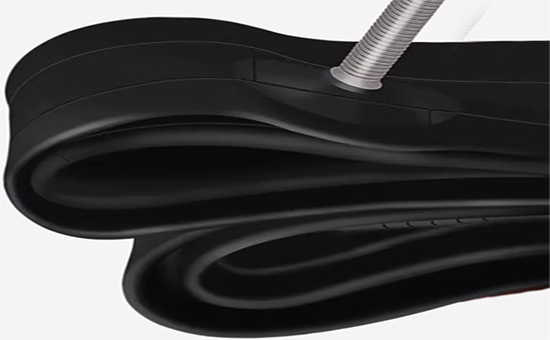The inner tube of a bicycle is a circular sealing rubber cylinder used to store compressed air. It is installed in the inner cavity of the bicycle outer tire and is mainly processed from natural rubber or butyl rubber. The isoprene reclaimed rubber is made from the raw materials of the isoprene unvulcanized rubber mixture and the bottle stopper and cap through cleaning, crushing, desulfurization, filtration and other processes. It has good air tightness, good viscosity, high and low temperature resistance, and aging resistance. It can be used in the preparation of bicycle inner tubes to reduce the cost of raw materials.
1. Application of recycled isoprene rubber in bicycle inner tubes
The physical properties of isoprene regenerated rubber are similar to natural rubber, and it has good compatibility with natural rubber. It can be used together with natural rubber to produce bicycle inner tubes, reducing costs while improving the inner tube's gas permeability, aging resistance, low-temperature flexibility, and so on. In actual production, isoprene reclaimed rubber can also be used in combination with natural rubber, tire reclaimed rubber, latex reclaimed rubber and other rubber raw materials to prepare high-performance and low-priced bicycle inner tubes, further improving the wear resistance, adhesion and extending the service life of the finished inner tubes.
Butyl rubber has excellent airtightness, heat resistance, aging resistance, and corrosion resistance, making it an ideal raw material for producing rubber inner tubes. However, the market price of butyl rubber is quite high, so when using butyl rubber to produce bicycle inner tubes, a certain proportion of butyl reclaimed rubber is often added. Isoprene reclaimed rubber can be used in combination with butyl rubber and butyl reclaimed rubber to produce bicycle inner tubes, which can reduce raw material costs and improve the vulcanization performance of butyl rubber as a comonomer.

2. Reference formula for producing bicycle inner tubes using recycled isoprene rubber
(1) Reference formula for producing bicycle inner tubes using natural rubber/isoprene regenerated rubber: 70 parts of natural rubber, 30 parts of isoprene regenerated rubber, 5 parts of zinc oxide, 1 part of stearic acid, 1 part of anti-aging agent D, 1 part of paraffin wax, 35 parts of light calcium carbonate, 35 parts of active calcium carbonate, 1 part of carbon black N330, 10 parts of black ointment, 0.25 parts of accelerator D, 0.6 parts of accelerator DM, and 2.75 parts of sulfur; A total of 192.6 copies.
(2) Reference formula for producing bicycle inner tubes using a combination of butyl rubber and isoprene regenerated rubber: 80 parts of butyl rubber, 20 parts of isoprene regenerated rubber, 5 parts of zinc oxide, 1 part of stearic acid, 32 parts of carbon black N550, 43 parts of carbon black N774, 20 parts of paraffin oil, 5 parts of Gumaron resin, 0.65 parts of accelerator M, 0.65 parts of accelerator ZDC, 1.3 parts of accelerator TMTD, and 1.6 parts of sulfur; A total of 210.2 copies.
The price of isoprene reclaimed rubber is much lower than that of natural rubber, butyl rubber, and other synthetic rubbers. It has good compatibility with other types of rubber and can be used in the production of bicycle inner tubes to reduce raw material costs, improve the vulcanization performance of rubber materials, optimize the joint process of butyl inner tubes, and enhance tear resistance; Improve the high and low temperature resistance and aging resistance of natural rubber inner tubes, and extend their service life. In the future, the editor will continue to share with you the key points of the production process of bicycle inner tubes using isoprene regenerated rubber.
Exclusive original article [commercial authorization] reprint, excerpt and excerpt in any form are prohibited without written authorization. Focus on Hongyun rubber: learn the process formula and raw material technology of producing rubber products from recycled rubber to help you reduce costs and increase profits